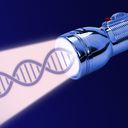Next-gen blood tests to detect cancer and other diseases come with questions

The ability to interrogate DNA, proteins and other material in the bloodstream for information about cancers, infectious disease and other conditions is rapidly advancing.
Why it matters: Next-generation blood tests can help detect some diseases early but it's still unclear how much they can improve treatment and ultimately affect whether someone survives a disease.
- Dozens of companies are trying to develop non-invasive tests, or liquid biopsies, that can pick up signals from tumors or evidence of infection.
- The market for liquid biopsies is predicted to reach more than $11 billion by 2030, according to one recent estimate.
How it works: Liquid biopsies sequence DNA, RNA, proteins and other material circulating in the bloodstream free from cells. Some tests analyze chemical modifications to DNA that indicate which genes are turned on or off — an epigenetic fingerprint that can point to what kind of cell the DNA came from and, for example, the origin of a cancer in the body.
- Prenatal tests that analyze cell-free DNA to screen for genetic conditions are routinely used despite concerns about false positive results with some tests.
- They're also being used to monitor for early signs that a transplanted organ is being rejected.
- And they're being developed to detect infectious diseases and to personalize cancer treatment.
Infectious diseases: Degraded DNA from microbes and pathogens circulates in the blood of people who have been infected.
- A commercially available test developed by Karius screens blood for more than 1,200 bacteria, fungi and viruses. Some studies have found the test can be used to more rapidly diagnose and target treatment for bacteria that cause sepsis, pneumonia and other conditions.
- "A lot of clinical tests are geared toward detecting the usual suspects. But with these modern technologies, you can also identify the unusual pathogens ... that are not frequently suspected," says Iwijn De Vlaminck, a biomedical engineering professor at Cornell University and an adviser to Karius.
- But some studies suggest more data is needed to assess how much next-generation sequencing tests can improve patients' outcomes. There are also current limitations, including that tests can pick up DNA even after a pathogen is dead.
- The intrigue: In the era of COVID risk calculus, the question of whether someone is infected versus infectious is front of mind in daily life. De Vlaminck and his collaborators are trying to analyze RNA in the bloodstream for precise indicators of the damage a pathogen has done to its host's cells — and whether they are infectious.
Cancer: Tumors shed fragments of DNA and protein into the blood that companies, including Haystack and Natera, are using to monitor for small amounts of cancer cells that can remain after treatment and are an early signal of recurrence.
- A recent study looked at the effectiveness of using liquid biopsies to decide whether someone should have chemotherapy after surgery to treat stage 2 colon cancer to try to prevent recurrence. Follow-on treatment for the cancer benefits only a small fraction of patients.
- Some patients' blood was analyzed for circulating tumor DNA that is an indicator of remaining cancer cells while another group of patients received the standard clinical assessment. In the group tested with liquid biopsies, 15% of patients then received chemotherapy versus 28% in the group getting standard care.
- After two years of monitoring, the rates of survival without a recurrence of the cancer were roughly the same — about 93% of patients in each group — even though fewer patients were treated with chemotherapy in the group that received liquid biopsies.
Beyond understanding a cancer in someone already known to have it, some companies are focusing on tests to screen people without symptoms for different kinds of cancers.
- Grail offers a multiple cancer screening test that requires a prescription. Exact Sciences and others are also developing tests.
- Liquid biopsies can detect some cancers early — which can be crucial for diseases like pancreatic cancer that typically aren't diagnosed until later stages when it is more difficult to treat.
- But some experts are concerned they can produce false positives that spur unnecessary treatments.
The big question: Do these tests really change someone's chances of survival?
- The answer — which depends in large part on the cancer and available treatment for it — could come from large clinical trials on the horizon.
- Depending on the results of a four-year pilot study — endorsed earlier this month by National Cancer Institute advisers — a follow-on study of nearly 300,000 people over seven to eight years could assess whether early detection with different liquid biopsies saves lives, Philip Castle, director of the NCI Division of Cancer Prevention recently told ScienceInsider.
What to watch: The field needs better proxies for understanding if a test is ultimately saving lives rather than waiting many years for an answer, says Nickolas Papadopoulos, a professor of oncology and pathology at the Johns Hopkins University School of Medicine, who is an adviser to Exact Sciences and on the board of Haystack.
- He acknowledges the risks of overtreating based on early detection but "what is the alternative?" he says, especially for cancers that aren't typically caught until their later stages.
- "We know that this is not working well so we have to change something."